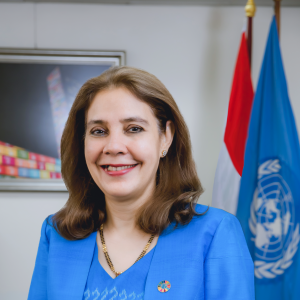Ibu Penny Herasati, Director for Socio-Cultural Affairs and International Organization of Developing Countries, Ministry of Foreign Affairs,
Ibu Indah, MoFA
Pak Judha, MoFA
UN Colleagues - Jeff, Nori, and Dwi.
Selamat Pagi.
Let me begin by thanking the Ministry of Foreign Affairs, particularly Ibu Penny, for the partnership we have forged together in support of migration governance, which saw the soft launch of the Migration Governance Indicators and the public discussion on the national action plan for GCM last week.
This is one of UN’s Joint Programmes for advancing SDGs, which the Deputy Secretary General personally champions. She is keen to have Member States committing to the SDG joint fund, as a whole of UN instrument, to bridge the financing gap and fast track SDG progress globally.
It is a privilege to co-chair today’s steering committee with you Ibu Penny, as we endorse the no cost extension to enable the programme to further sustain its impact and independently evaluate the results.
This joint programme targets migrant workers and invests in innovative financing models, technology and subnational planning to build capacities, protect and secure lives and livelihoods.
Let me take the opportunity to highlight three critical outcomes.
Analysis suggests that an investment of $2000 is required for each of the 270,000 new migrant workers annually.
To bridge migration financing, IOM is testing models targeted to support returnees as economic stakeholders and their integration into communities across provinces, which are the highest contributors of migrant workers.
This includes establishing village cooperatives, promoting bankable village enterprises, supporting digital marketing of local produce, and generating a return of up to $200 a day.
Taking these models of economic empowerment to scale, will need to be led by local governments backed by tailored technical and financial support for returnee migrant workers.
This is where UNDP’s technical assistance to local governments becomes imperative. The partnership with local governments aims to mainstream migration into their Regional Medium-Term Development Plans. which will serve as the reference for national policy and programme for protection of migrant workers.
It strengthens vertical and horizontal policy coherence for safe and orderly migration. Getting this right in the three pilot provinces of NTT, Central Java and South Sulawesi, in cooperation with the Ministry of Home Affairs and the key departments, can set a model ready for replication.
Given that over half of the migrant workers are women, UN Women’s partnership prioritises empowering women migrant workers to access the integrated criminal justice system to protect them, when vulnerable to gender-based violence and trafficking. The approach is premised on enhancing coordination, referral mechanism and ensuring a rights-based victim cantered approach throughout the justice continuum. This includes strengthening the Safe Travel mobile application, together with Kemlu, to ensure end-to-end protection of Indonesian migrant workers.
Lastly, let’s showcase regionally and globally, what we are achieving through this partnership, strengthening Indonesia’s position as a champion country for the global compact and a leader in support of migration governance.
Terima kasih






